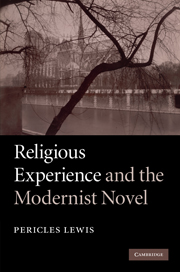Book contents
- Frontmatter
- Contents
- Acknowledgments
- 1 Churchgoing
- 2 God's afterlife
- 3 Henry James and the varieties of religious experience
- 4 Marcel Proust and the elementary forms of religious life
- 5 Franz Kafka and the hermeneutics of suspicion
- 6 Virginia Woolf and the disenchantment of the world
- 7 The burial of the dead
- Notes
- Select bibliography
- Index
1 - Churchgoing
Published online by Cambridge University Press: 26 February 2010
- Frontmatter
- Contents
- Acknowledgments
- 1 Churchgoing
- 2 God's afterlife
- 3 Henry James and the varieties of religious experience
- 4 Marcel Proust and the elementary forms of religious life
- 5 Franz Kafka and the hermeneutics of suspicion
- 6 Virginia Woolf and the disenchantment of the world
- 7 The burial of the dead
- Notes
- Select bibliography
- Index
Summary
In Philip Larkin's “Church Going” (1954), a bored cyclist visits an empty church. Hatless, he removes the cycle-clips from his trousers in a gesture of “awkward reverence.” He contemplates the church building with some confusion, uncertain of the names or meanings of various architectural features, and wonders what a future after religion can hold for such houses of God:
Power of some sort or other will go on
In games, in riddles, seemingly at random;
But superstition, like belief, must die,
And what remains when disbelief has gone?
For Larkin, superstition, belief, and disbelief all belong to a dead past, albeit one that his poem tries to call back to life. Larkin writes in the 1950s, at the end of the modernist period, and already he expresses some skepticism toward the possibility that literature can take over the “power” left behind by organized religion – a calling, and an anxiety, bequeathed to modernism by Matthew Arnold, who had predicted in 1880 that “Most of what now passes with us for religion and philosophy will be replaced by poetry.” In this book, I argue that the “melancholy, long, withdrawing roar” of the “Sea of Faith” that Arnold heard on Dover Beach in the middle of the nineteenth century would continue to sound, even among the ostensibly faithless Western elites, for at least a hundred years.
- Type
- Chapter
- Information
- Religious Experience and the Modernist Novel , pp. 1 - 22Publisher: Cambridge University PressPrint publication year: 2010

